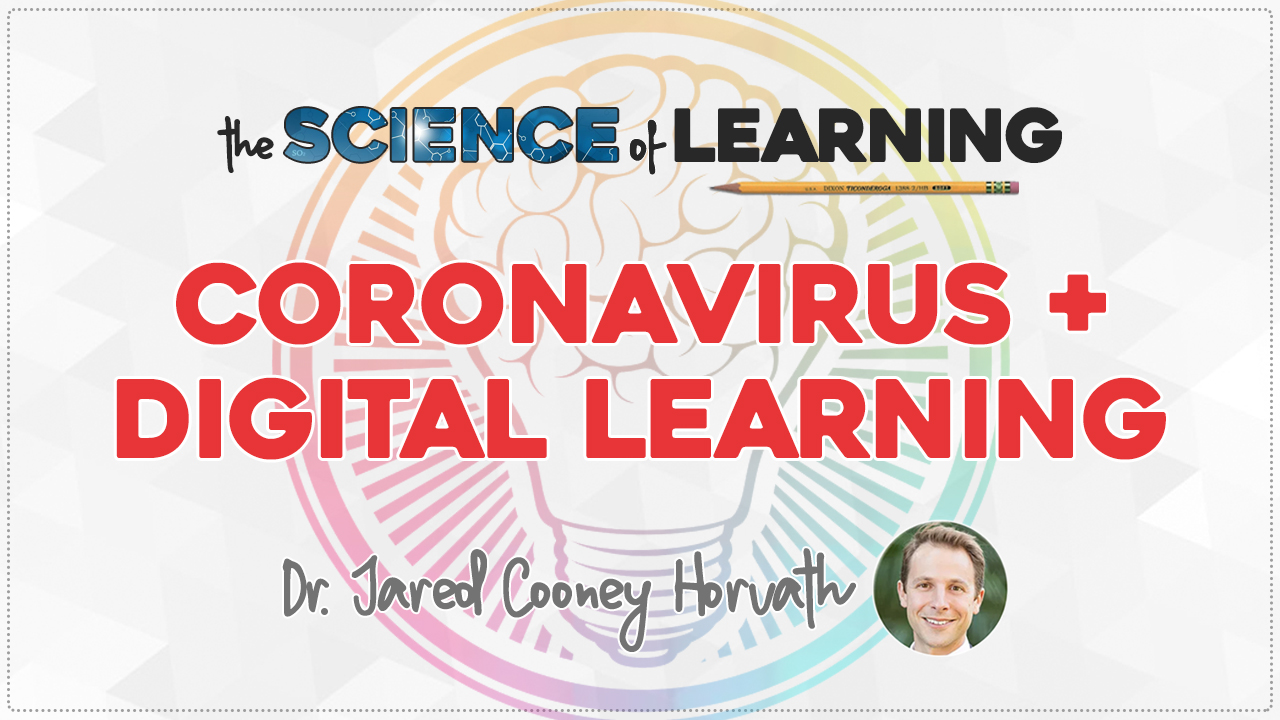

Jared Cooney Horvath is a globally recognized Science of Learning expert committed to helping teachers, students and parents achieve better outcomes through applied brain and behavioral science.
CORONAVIRUS + DIGITAL LEARNING
With the coronavirus pandemic in full swing, governments across the globe are mandating school shutdowns to help reduce further spreading of the virus. As a result, many schools are being forced to move all classes online during this unforeseen interregnum.
Now, under normal circumstances, I believe that if a class can be done live - do it live! Learning is always more effective in person. However, circumstances are far from normal … and for many of us, live learning is not an option.
With this in mind, are there any tips that we as teachers can offer students to improve their digital learning experience?
Well, unfortunately I can’t help with things like poor internet-connections, or the many privacy issues that arise when students attend class from home (think Dad walking by a live-feed in his underoos).
But there are 3 learning-specific ideas that I think we should all emphasize with our students during these unusual times:
#1 | MULTITASKING KILLS MEMORY AND LEARNING
When students access a computer for learning purposes, they (on average) last less than 6 minutes before they start multitasking (surfing the web, live chatting, checking their socials, etc.). When this happens, learning is doomed.
Accordingly, it’s important to remind your students that during online classes, they are in complete control of their learning. As teachers, we cannot monitor their peripheral activities, nor can we keep them focused and on-task.

This means that students need to be made aware of the relevant pitfalls of multi-tasking, and they should attempt to actively control their digressive impulses during class time.
To help your students grasp (and hopefully embrace) this concept, feel free to share the video link below. In this short and interactive clip, I discuss how multi-tasking impacts learning:
https://www.lmeglobal.net/
#2 | BE AWARE OF CONTEXT DEPENDENCY
All new learning is inescapably tied to the context in which it is learned.
Unfortunately, this means that when students are thrust into a novel learning context (like a kitchen table or a crowded bedroom), their learning will likely suffer. This is because their brains will be forced to work overtime in the absence of the normal environmental cues and crutches they’ve come to rely on.
In the digital world, many students might find that they struggle to recall and access knowledge they were able to easily play with in class. By the same token, when they return to school in (hopefully) late-March, students may struggle to access some of the knowledge they acquired digitally during the prior month.
So, it may be productive to reassure your students that despite any struggles they experience during this atypical period, the information IS STILL in their brains! They have not forgotten or lost it in any way … they simply need to work at transferring the information across different contexts.
This means that once your students are back in the physical classroom, you might want to help them with the re-transition process by carving out time to facilitate spaced recall sessions.
As a bonus, once your students learn to freely access new knowledge across diverse contexts (i.e. digital + classroom), they will also find that it’s easier to access this same knowledge in novel contexts they encounter in the future (like, say, an exam room).
For more information about context dependent learning (including related classroom strategies), check out the recent interview I did with Jake Miller on his Educational Duct Tape Podcast:
https://jakemiller.net/eduducttape-episode-34/
#3 | PROLONGED STRESS KILLS MEMORY
In short bouts – typically brought on by novelty or challenge – stress can benefit learning by helping to reinforce deep, accessible memories.
However, once stress becomes chronic and prolonged (say, over the course of several days), it becomes incredibly difficult to form new memories. In other words, it becomes almost impossible for students to learn new material when they’re experiencing stress for several days.
Now, most students probably won’t be impacted by this ... but it's likely that some of your students will be personally affected by the coronavirus (and/or the related cultural upheaval), and as a result they might experience a continued stress-state for days (or perhaps weeks).

For these students, they need to recognize that much of the learning struggle they might be experiencing is not reflective of themselves or their ability, but instead could be a sign that their brain is simply not in a condition to retain new information.
These students will likely be able to practice, revise, and re-visit previously learned and understood material … but we should not be surprised if they fail to make headway with new material.
Until they feel safe again – and the stress-response has abated – all new learning will be inconsistent at best.
Of course, this idea can only be practically applied on a case-by-case basis. As such, it might be worthwhile to solicit some information about your students’ stress-levels so you can adapt your practice/approach to any cases you deem to be severe.
For more information about the relationship between stress and learning, click the link below to read the chapter about stress from my newest book 'Stop Talking, Start Influencing':
http://lme.global/stress-and-learning
---
Anyway, I hope this helps.
This is an absolutely crazy time right now, and I am so impressed with all the hard-work and creative-thought that is going toward ensuring students still get the teaching/learning they need.
If nothing else, this inconvenient exercise should serve as a valuable (and perhaps unprecedented) experiment to discover how digital learning works on a grand scale … and it will be interesting to reflect upon it once everything has normalized.
Regards,

DID YOU ENJOY THIS ARTICLE?
Help spread the idea by sharing it with your peers and colleagues ...

NOT ON THE LIST? Click below to join the LME Community ... and receive new Science of Learning articles from Dr. Jared Cooney Horvath every week!
Copyright © 2022 LME Global
6119 N Scottsdale Rd, Scottsdale, AZ, 85250
(702) 970-6557
Connect With Us
Copyright © 2022 LME Global – 6119 North Scottsdale Road, Scottsdale, AZ, 85250 – (702) 970-6557
